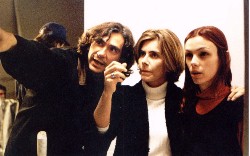THE DIRECTOR SPEAKS
When I realized, after almost three years of raising funds, that we would finally start shooting “Tolerance”, I felt a chill up my spine. I had never directed a project of this magnitude, with a budget of 2 million reais. It was a very big responsibility. But then, gradually, while Luli (Luciana Tomasi, executive producer) and Nora (Nora Goulart, also executive producer) planned everything, I started to look at the film the only way a director can face a film without going crazy: it is just another movie.
 Perhaps
it was more important, perhaps it was more challenging, perhaps more complicated,
but, in the end, it was just another story to tell through moving images
and synchronized sound. It was not that different from what I – I mean,
we – had done before. Including the super-8 films, “Tolerance” is my thirteenth
project as a film director. I had already made two feature films, “Inverno”
(Winter) (super-8) and “Verdes Anos” (Green Years) (35mm), the latter I
co-directed with Giba Assis Brasil. So, while it still scared me a bit
to face the 7-week shoot, I thought: “What could be so different about
this? It’s just another movie.” And, in the end, the seven-week shoot and
the two preceding weeks of rehearsal and preparation went very smoothly.
Perhaps
it was more important, perhaps it was more challenging, perhaps more complicated,
but, in the end, it was just another story to tell through moving images
and synchronized sound. It was not that different from what I – I mean,
we – had done before. Including the super-8 films, “Tolerance” is my thirteenth
project as a film director. I had already made two feature films, “Inverno”
(Winter) (super-8) and “Verdes Anos” (Green Years) (35mm), the latter I
co-directed with Giba Assis Brasil. So, while it still scared me a bit
to face the 7-week shoot, I thought: “What could be so different about
this? It’s just another movie.” And, in the end, the seven-week shoot and
the two preceding weeks of rehearsal and preparation went very smoothly.
Of course there were differences between shooting “Tolerance”, in 1999, with a crew of over 50 professionals, and shooting “Meu Primo” (My cousin), a super-8 shot in 1978 with my friends Nelson Nadotti and Hélio Alvarez. The main difference was that there was a rational division of tasks, leaving me more free time to think about the film itself and not about the thousands of production details which make a film possible. In that sense, the roles of Alex Sernambi (cinematographer), Ana Luiza Azevedo (assistant director) and Fiapo Barth (art director) were crucial. They did the découpage of the entire film with me long before the beginning the shoot, so the four of us knew exactly what to do when the “crunch" came. When any doubts arose, we just had to check the storyboard.
Shortly before we started shooting I told them: “In this movie I’d like to divide my time on the set in a different way – 70% for the actors and only 30% for the camera”. That is what we did. That was how I managed to devote as much attention as possible to the acting. I was certain that the success of “Tolerance” would depend very much on the cast, and I did all I could so that every actor had the support he or she needed. I think it worked. Another crucial factor was the easy and generous integration between the actors who came from Rio de Janeiro (Maitê, Bomtempo and Maria) and the all the local actors.
 Another
important aspect in “Tolerance” is the collective effort. I believe in
authorship, and I am the author of the film, but I also believe that authorship
in films can - and actually should - be shared. I believe, for instance,
that the screenplay has to be improved up until the start of the shoot.
In this aspect Jorge Furtado’s work was decisive. He took a story structured
like a straight drama and – without distorting the central idea or the
essence of what I wanted to discuss – turned it into a thriller with lots
of action, drama and humor. “Tolerance” is his work too. And it is also
Álvaro Teixeira`s (who wrote many of the dialogs) and Giba Assis
Brasil`s (who did the final revision of the script and added important
structural touches, such as the narrations that open and close the film).
As he was also the editor of “Tolerance”, Giba, once more, made sure that
the audiences would see a well-paced movie, with no “dramatic holes”, mercilessly
cutting everything that was not essential.
Another
important aspect in “Tolerance” is the collective effort. I believe in
authorship, and I am the author of the film, but I also believe that authorship
in films can - and actually should - be shared. I believe, for instance,
that the screenplay has to be improved up until the start of the shoot.
In this aspect Jorge Furtado’s work was decisive. He took a story structured
like a straight drama and – without distorting the central idea or the
essence of what I wanted to discuss – turned it into a thriller with lots
of action, drama and humor. “Tolerance” is his work too. And it is also
Álvaro Teixeira`s (who wrote many of the dialogs) and Giba Assis
Brasil`s (who did the final revision of the script and added important
structural touches, such as the narrations that open and close the film).
As he was also the editor of “Tolerance”, Giba, once more, made sure that
the audiences would see a well-paced movie, with no “dramatic holes”, mercilessly
cutting everything that was not essential.
A few words about the musical score... Since the beginning of the project, I wanted to use many songs by local bands, whether they were well known or not. The quality of the urban music of Rio Grande do Sul, particularly rock, is excellent, and I felt that it would help provide the atmosphere for my “porto-alegrense” story. I heard dozens of CDs, in many styles (from punk rock to avant-guarde music), and I selected some of the tracks, which I started to try out on the image (helped by Flu and 4Nazzo), as soon as editing started. It was not enough for the song to be good: it had to be a good song and it had to suit a particular scene. At the end of the process, we kept twelve songs that had already been recorded by the bands and three songs that had to be re-recorded especially for the film. At the same time, more than 40 incidental tracks were created and arranged. I believe that our musical score, because of its esthetic diversity and, sometimes, its radicalism in terms of sonority, is quite different from what we have been seeing in Brazilian cinema lately.
I would like to thank everyone who helped me make this
movie. It was hard work, but it was also fun. It hurt but it also healed.
It was tiring, but it renewed our hopes of turning filmmaking into the
main activity in our lives. Because when the film is rolling inside the
camera, registering the light captured by the lenses, and the microphone
captures the sound, life itself stops around us. “Tolerance” is just another
movie; however, like any movie made with feeling, it is a powerful audiovisual
testimony about our strange – and almost always unexplainable – passage
on this planet.
PRESENTATION | ABOUT | PROJECT | DIRECTOR | STORY | SCREENPLAY | CAST | INTERVIEWS | SURVEY | TOLERANCE
THE CASA | FILMS | PROJECTS | LINKS | NEWS | CONTACT | MAIN PAGE | EM PORTUGUÊS | EN ESPAÑOL